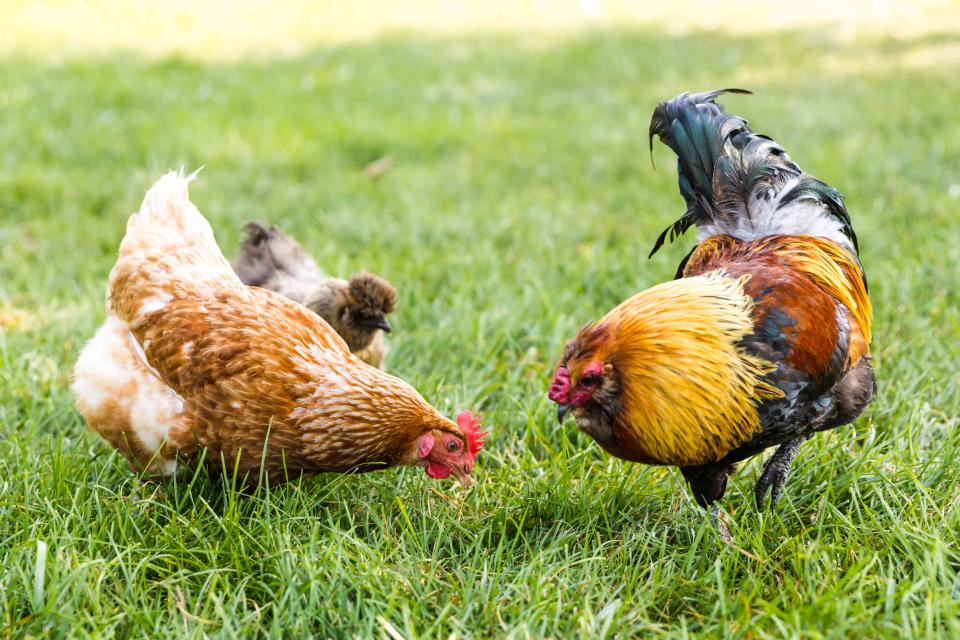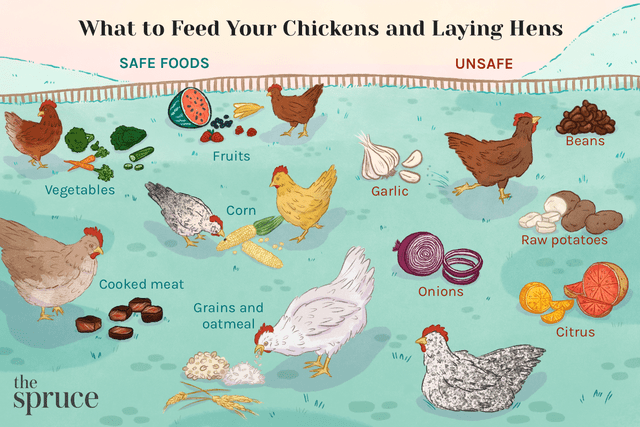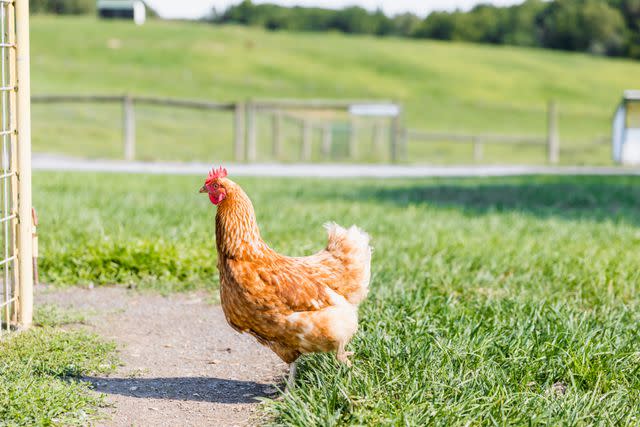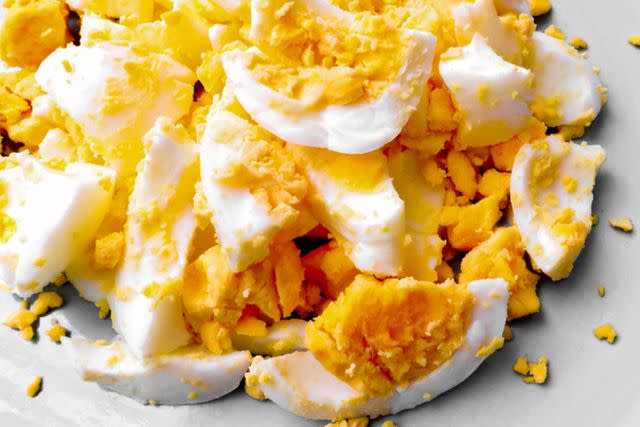What to Feed Chickens
Best Foods for Backyard Chickens (With or Without Chicken Feed)

The Spruce / Anastasia Tretiak
Reviewed by Amanda Rose NewtonFact checked by Sarah Scott
If you're just getting started keeping laying hens or meat poultry on your small farm, you may be wondering what chickens eat to maintain their health. It helps to know the best diet you can provide for your chickens and poultry when they're roaming and foraging outside in a pasture or a run. Dark leafy greens and vegetables, cooked beans, berries, and whole grains are among the best treats for your chicken. Chickens will eat whatever is put in their enclosure so keep in mind foods that should be avoided such as dried beans, citrus peels, and anything rotten or high in sodium.
The 9 Best Chicken Coops of 2023
What Do Chickens Eat?
Chickens rummage for earthworms, insects, and slugs of all kinds to eat. You may even see a rooster catch a mouse to feed his hens. However, most poultry also like to eat the tips and seeds of growing grasses and weeds. Some favorites are clover, buckwheat, Kentucky bluegrass, and any broad-leaved weeds such as dandelions. These are the main foods chickens eat:
Chicken feed
Small insects
Fruits and vegetables
Grasses and weeds
Small animals
Tip
A little grit, like sand, gravel, and coarse dirt, is important to poultry. They keep it in their gizzards to help them grind up the wild foods they forage.
What to Feed Chickens on the Farm
Different types of chickens require different diets. Typically, backyard and small farm chickens raised for eggs can eat appropriate food scraps from the farm household in addition to feed. Meat birds raised indoors or on a pasture are small, but voracious eaters, and require mostly high-protein feed to reach top weight efficiently. The feed needs to be monitored to help the birds avoid overeating, which could lead to fatalities. You'll also need to determine whether to vaccinate your meat birds to be able to give them non-medicated feed. Meat birds raised outdoors in a pasture eat a more rounded and healthier diet by foraging on plants, insects, and small animals in addition to feed.
Warning
Unfortunately, all chickens think non-food items, such as Styrofoam, are edible, and some munch on the pine shavings of their litter, so you'll also need to make sure they don't eat what they're not supposed to.
Kitchen Scraps: What Can Chickens Eat?
Besides the main feed, there are quite a few kitchen scraps that pastured chickens (not raised for meat) can gobble up. There are also certain foods from the kitchen which are dangerous for poultry to eat. Here's what chickens and hens love to eat from the kitchen:
Beef and pork scraps (including gristle, tendons, and fat)
Cooked rice and pasta
Cooked vegetables
Dairy such as milk, cheese, yogurt, and cottage cheese
Eggshells and oyster shells (for calcium)
Fats and oils (congealed to pudding texture)
Fish and fish skin (but avoid bones)
Fresh fruits (apples, grapes, and bananas to name a few)
Stale bread and crackers (avoid moldy items)
Wilted salad greens
Tip
Though poultry love fresh fruit, they typically avoid eating citrus fruits, like oranges and grapefruit.
What Not to Feed Chickens
Here's what you should avoid feeding your poultry:
Avocados
Chicken scraps (can spread disease through cannibalism)
Chocolate
Coffee or coffee grinds
Peels from potatoes or citrus fruits
Processed foods
Salt (pure)
Soft drinks
Warning
Raw potatoes can be poisonous to chickens due to glycoalkaloids.

The Spruce / Brianna Gilmartin

Emergency Feed
After you collect the eggs, you can hard boil and chop them (or scramble them) and feed them to the chickens if you run out of feed. Remember, they can also go a day or two without feed, and longer without experiencing any real issue as long as they are eating general kitchen scraps. Of course, always make sure they have water to digest food and feed.

Make or Buy Your Feed
Tip
Pasturing requires more elements to keep the chickens protected from predators, including a livestock guardian dog and/or fencing.
You may wish to design, buy, and mix your own feed, or even grow all the grains, seeds, and other components of a comprehensive chicken feed. There are several different commercial feed choices with different purposes for each one. Some of the specifics differ. For example, one manufacturer may have you switch to grower/finisher at a different number of weeks, a suggestion that may differ from another supplier. Always follow the directions of your specific feed and check with your feed supplier or store when in doubt.
Tip
Wash, dry, then grind calcium-rich eggshells before feeding to your chickens and hens.
Pasturing Chickens
Should you pasture your chickens or provide a chicken run? Any outdoor time for chickens will create healthier, more relaxed poultry. Whether you pasture or provide a run depends on the space you have for your chickens.
The 7 Best Automatic Chicken Coop Doors of 2023
Benefits of Pasturing
Hens that are raised primarily on pasture with a healthy diet produce eggs that boast bouncy, deep orange yolks and thick, viscous whites. If you are raising meat birds primarily on pasture, you should be aware that they will not grow as quickly as those confined and fed broiler rations. The meat is dense from the exercise they get (yet still tender) and their omega-3 content is higher than their grain-fed, sedentary counterparts.
Fun Fact
The most common meat chicken, known as a broiler, is the Cornish Cross (a hybrid Cornish and White Plymouth Rock chicken). This type of bird grows rapidly and efficiently for the best meat production.
Benefits of a Run
If you can't pasture your chickens but can let them have access to a run (a fenced-in area outside the coop, which will also need to be protected from predators), they will be happier and will be able to get some supplemental insects, even if the floor of the run gets pecked down to bare dirt. They will also be able to sun bathe and dust bathe which are natural and relaxing behaviors.
Frequently Asked Questions
Do hens need special feed to lay eggs?
Laying hens will need a layer feed fortified with calcium. This contributes to high eggshell quality. It may also be necessary to supplement the diet with ground oyster shells for even more calcium. Laying hens should be on a diet that is 15% protein overall.
What foods do chickens need daily?
In order for your birds to thrive, a combination of proteins, grains, greens, vitamins (A & D), and calcium are necessary in their diet. Clean, fresh water in their coop or enclosure is also a must.
Can you overfeed chickens?
Although they will naturally stop eating their feed once full, it is possible to overfeed your chicken through an unbalanced diet. Overeating the wrong things in excess such as treats, table scraps or scratch grains can lead to health problems and may be fatal.
Read the original article on The Spruce.
